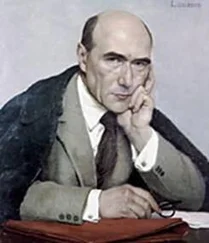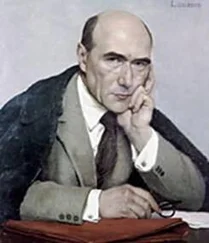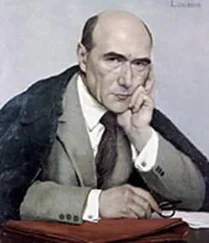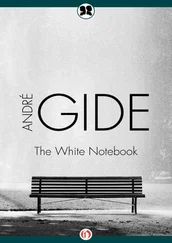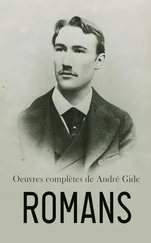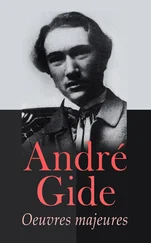Nevertheless, I think that his cult remained intact for Mallarmé, whom he considered a master and his predecessor on the arduous road along which he was to follow him, but only to bypass him soon, it seems to me. Besides, Valéry remained one of the most faithful of friends: “I am in love with friendship,” he might have said with Montesquieu. In spite of his anti-semitism, so tender of heart and so sensitive — his intimate friends had many proofs of it — but also of such reticence that he would doubtless reproach me for speaking of it. This cynic was capable of attentions and exquisite courtesies with his relations and those to whom he was attached. Now that he is no more, I would dare to relate the following: a short time after the death of Mallarmé, he came to me saying: “There is talk of a monument they propose to erect. The list of subscribers will appear, as is proper, in the papers. However, Mallarme is leaving a widow and a daughter in that apartment where we went so often and whose rent is still due; well? No one is worrying about that. I am not in a position to assume that responsibility all alone. I thought you would help me perhaps … but, don’t tell anyone, will you?”
Financial worries dogged him all his life. He was always afraid of being short; this, added to his desire to oblige, kept him hiding from incessant demands, solicitations, requests. From this resulted his talks, his numerous prefaces: “One seems either not to understand or not to believe — and yet I have said it often enough — that my work is made up for the greatest part only of responses to demands or chance circumstances, and that without those solicitations or external necessities, it would not exist,” he might write. The excess of obligations he allowed to be imposed upon him wore him out; he would have liked to throw up the game, ask mercy: “All these charming people will kill me,” he said. “Do you know the epigraph that will have to be engraven on my tomb? — Here lies Paul Valéry killed by others.” But one is forced to recognize that a number of his best pages were born thus of a provocation. Besides, nothing he wrote could be neglected. Drawing on a reserve pile, he scattered his treasures about in sparks. At any rate his writings, of a rare quality, were addressed only to a restricted public. His books were never best sellers. Their teaching could be understood only by the elite; and it was not even desirable that it be followed by a great number; for, like Nietzsche’s, it is in danger of destroying those whom it does not strengthen.
His reputation was not long in spreading and not only in France. I do not know how the representative of the Chartered Company, having heard Valéry praised, had him come to London, while still young, to entrust him with a highly important work. Restrained by discretion, and in addition of a nature not very confiding, Valéry only notified a few people of this extraordinary adventure, eminently surprising in so inactive a life. And I hardly remember the story he told me, immediately on his return from London where that mysterious work kept him some weeks, the strange conditions of life to which he had to lend himself. Of the nature of the work, secretly engaged in, he did not tell us a single word. I only learned that, as soon as he arrived in England, received by a stranger whose name he never knew, he was taken to London, then set down in a sort of apartment comfortable but sealed; and, during the entire time of his stay, he was not at leisure to leave it; forbidden equally to communicate with anyone whatever. A servant, deaf and dumb, or claiming to be so, or who did not speak any common language, brought him his meals every day, went away without having opened his mouth. That almost agreeable jail did not come to an end until after Valéry had finished his task. He was immediately conducted to the port of embarkment by the same one who had brought him, and retained the remembrance of all that like a dream.
Journalists spoke of the employment he probably assumed, in 1900 and for a rather long time, at the Havas Agency. That is not exact. The truth is, that he occupied with the old Leboy, founder of the famous agency but retired at that time, the duties of private secretary, reader and adviser. A confidential post in which Valéry had complete freedom to exercise his wisdom, his competency in political, diplomatic and financial matters, the firmness of his judgments, his probity, his tact, and finally the exquisite courtesy of his manners and delicacy of his sentiments. He spoke of that old man, for whom he had conceived a deep affection, with great deference; “a sort of father Leuwen,” he said, afflicted by active paralysis which did not leave him master of his movements. To those who came to see him, he said, not being able to hold out his hand which the infirmity made tremble: “Grasp my hand, I beg you.” Seated in a large armchair, he listened to the reading of the papers and the sermons of Bourdaloue (which he preferred to Bossuet’s); but Valéry confessed to me that often he skipped pages. That lasted months, years. And he doubtless learned a great deal from that wise old man, in those delicate functions which put on trial the practical qualities of his mind. Leaving the abstract field of mathematics, when he brought “his eyes down to the present world,” his judgments, his predictions were of a pertinence that to-day appears to us prophetic, and I do not think anyone, at that time, uttered better thought-out appreciations on the situation in Europe and France.
What he wrote in 1927 on the subject of the French nation remains astonishingly present-day and of a striking timeliness:
“This nation, nervous and full of contrasts, finds in its contrasts unexpected resources. The secret of its prodigious resistance lies, perhaps, in the great and multiple differences it combines in itself. In the French, the apparent lightness of character is accompanied by a singular endurance and elasticity. The general ease and graciousness of their relationships is joined, with them, to a sentiment critical and always wide-awake. Perhaps France is the only country in which ridicule has played an historic role; it has undermined, destroyed some regimes, and one “wise crack” is sufficient, a happy witticism (and sometimes too happy) to destroy, in the public mind, in a few moments, great powers and situations . Moreover one observes in the French a certain natural lack of discipline which gives in always to the evidence of the necessity of discipline. It happens that one finds the nation suddenly united when one could expect to find it divided.”
Before entering into the silence, Valéry had let appear, one after the other, The Method of Leonardo da Vinci (1894), in the Nouvelle Revue of Madame Adam, and in Le Centaure, then directed by Pierre Louys, the amazing M. Teste (1895), extraordinary creation, without its like in any language; an accomplished work, perfect, before which we all had to bow our heads. As he had just revealed his method to us, through Leonardo da Vinci, Valéry gave to us here, thanks to that sort of semi-mystical alibi, his ethics, his behavior as regards things, beings, ideas and life. He held to it, and remained faithful to it up to the end, constant to himself; so that, a short time before his death, he could say (these are his own words I quote): “The principal themes about which I have grouped my thought for fifty years remain for me UNSHAKABLE.” He pronounced the last word strongly accenting each syllable.
However, don’t let’s be deceived. Monsieur Teste is not Valéry, but just a projection of him: of a Valéry divested of that sprightliness, that poetic humor, that pleasing graciousness, of everything that made us love him. To be sure, he was able to look upon the bustle all about as vain, and to lend it only a passing attention, but it was generally with a kind of indulgence, as long as he did not find himself disturbed by it, or even with that sort of amusement we assume sometimes in regard to the trifling games of children. I see him, at the time, manipulating for the pleasure of his intimates and with an astonishing zest, the marionettes of a little Punch and Judy theatre just as later he could lend himself to the tournaments of society conversation and the comedy of the salons. Besides he even liked to do it, received with open arms as he was, fussed over, listening little and talking a great deal, sparkling and manifestly amused to carry away such easy success, or rather to verify the ease with which success is obtained. Even with his intimate friends, the seriousness of his thought never cast a shadow over his smiling graciousness. Nothing more instructive on this point than the letter supposedly from Madame Teste, a unique text, of exquisite delicacy, and singularly revealing of the secret sensibility of that mathematician. “I think he has too much continuity in his ideas,” he will make Madame Teste say a little plaintively, speaking of her terrible husband. And besides (Orientem versus) Valéry, fully conscious of the mortifying danger of a too unyielding severity, will write: “I am impatient with vague things. In them you have a sort of disease, a particular irritation, which is directed against life, for life would be impossible without ‘approximately’.”
Читать дальше

